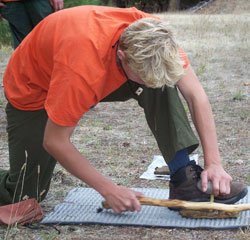The growing evidence of empirical research has established that wilderness treatment programs are effective and successful in helping struggling adolescents.

The growing evidence of empirical research has established that OBH programs are effective and successful in helping struggling adolescents.
The field of outdoor behavioral healthcare is over 30 years old, and focuses on the treatment of adolescents, young adults, and families struggling with behavioral, substance abuse, and mental health issues. The Outdoor Behavioral Healthcare Council (OBH Council) has been instrumental in facilitating research to study the efficacy of this treatment modality.
Understanding the importance of working with third-party researchers outside the OBH Council, the OBH Council helped advocate for the creation of the Outdoor Behavioral Healthcare Center in 2015. The Council understands that quality research has to be objective and critical in order to truly improve and move the field forward, therefore its members have chosen to support independent researchers through supporting the creation of the OBH Center and seeking research presentations for symposiums.
The Council is committed to engaging in research on a variety of levels, including at a programmatic level as well as projects that are created and run by researchers at the OBH Center (See OBH Center Ethics Statement below). Since its inception, the OBH Center has grown to focus on a wide range of programs not limited to OBH in order to grow the continuum of care for youth and young adults in need of integrative and kinesthetically engaged programs.
To see research conducted on OBH programs as well as the larger field of adventure therapy visit the OBH Center's Publications Website
For information on Outdoor Behavioral Healthcare Council’s research initiatives, contact us at info@obhcouncil.org Subj: OBH Research.
OBH Center Ethics Statement
Transparency, objectivity, and trust are critical features of all practices of the OBH Center. All of the research produced by the OBH Center is reviewed by the Institutional Review Board (IRB) of the University of New Hampshire (UNH) for ethical and accurate research practices before any studies ever begin. All research practices conducted by the Center follow not only the guidelines of the IRB at the UNH, but also the Missenden Code of ethics and accountability (2002) for appropriate ethical practices by university research entities. Research conducted by the OBH Center seeks to:
- address universal problems resulting in benefits for society as a whole
- be objective in the design and implementation of research activities and take an unbiased position in reporting results
- conduct all operations openly, honestly, objectively, and responsibly
- disclose to all colleagues and the public any financial or personal interests so that audiences are fully informed.
- be independent in the research and publication of any informed findings and publications
The Center receives its funding from the University of New Hampshire, federal and state funding, the Outdoor Behavioral Healthcare Council (OBH Council), the National Association for Therapeutic Schools and Programs (NATSAP), and foundations (e.g., the Jewish Community Federation of Baltimore). The non-UNH research scientists of the OBH Center are independent of all funding entities, and these entities have no involvement in the selection of research topics, how research is conducted, where research is published, and the findings and interpretations of these research projects.
For more information, see:
https://www.unh.edu/undergrad-research/ethical-and-responsible-conduct-research-training
